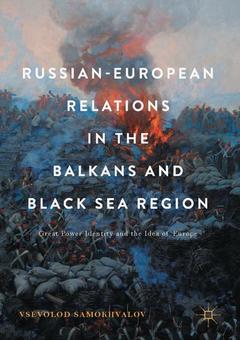Description
Russian-European Relations in the Balkans and Black Sea Region, Softcover reprint of the original 1st ed. 2017
Great Power Identity and the Idea of Europe
Author: Samokhvalov Vsevolod
Language: English
Subject for Russian-European Relations in the Balkans and Black Sea...:
Keywords
inter-ethnic conflicts; Russian-European security interaction; conflict resolution; Russian-European crisis; politics of the Black Sea region; Soviet mind-set; Valentin Pikul; Russian indentity in literature; Soviet discourse; Russian-European interaction; colloboration between Russia and Europe; russian and post-soviet politics
Approximative price 105.49 €
In Print (Delivery period: 15 days).
Add to cartPublication date: 07-2017
Support: Print on demand
Approximative price 105.49 €
In Print (Delivery period: 15 days).
Add to cartPublication date: 05-2018
Support: Print on demand
Description
/li>Contents
/li>Biography
/li>Comment
/li>
This book provides a detailed analysis of Russia?s ?great power identity? and the role of Europe in forming this identity. ?Great power identity? implies an expansionist foreign policy, and yet this does not explain all the complexities of the Russian state. For instance, it cannot explain why Russia decided to take over Crimea, but provided only limited support to break-away regions in Eastern Ukraine. Moreover, if Russia is in geo-economic competition with Europe, why has no serious conflict erupted between Moscow and other post-Soviet states which developed closer ties with the EU? Finally, why does Putin maintain relationships with the European countries that imposed tough economic sanctions on Russia? Vsevolod Samokhvalov provides a more nuanced understanding of Russia?s great power identity by drawing on his experience in regional diplomacy and research and applying a constructivist methodology. The book will appeal to students and scholars of international relations, in particular Russian-European relations, Russian foreign policy and Russian studies.
I: Russian-European relations: an “unexpected” crisis.- II: Greatness, Identity and Method.-III: Writing Russianness, Greatness and Europe in the 1960s.-IV: Writing Russianness, Greatness, Europe and the Balkans in the late Soviet Discourse in the 1980s.- V: Russian-European Security Interaction and the Idea of Great Powerhood between 1991-1999.- VI: Reinvention of Europe and EU-Russia Relations in Putin’s Era 2000-2010.- VII: “Black Swan”: New Greatness, False Europe and the Ukraine Crisis (2002-2014) .- VIII: Conclusions.
Vsevolod Samokhvalov is a Research Fellow at the University of Cambridge, UK, and a Marie Curie Research Fellow at the University of Liege, Belgium. He is also a Visiting Professor to the College of Europe. Vsevolod has worked as policy analyst and journalist in the Black Sea region, Balkans, London and Brussels.
Offers a timely contribution to the current debates on Russian-European relations, showing how Western academic discourse shaped Russian decision-making in the Ukraine crisis
Problematizes the term ‘great power identity’, which has become a common place in various studies of Russian foreign policy
Uniquely combines constructivist methodology with traditional policy analysis




